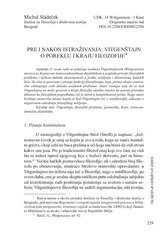Pre i nakon istraživanja : Vitgenštajn o poreklu i kraju filozofije
Before and after the Investigations: Wittgenstein on the Origin and End of Philosophy
Апстракт
This paper points to the relaton between Wittgenstein’s position and Kant’s transcendental dialectics with regard to the nature of philosophical problems and
their roots in language, thinking and affinities of humans. Related to this, there is the question of function of philosophy which involves the removal of these problems, according to both authors. The author supports the thesis that, when it comes to Wittgenstein, it cannot be discussed about the end of philosophy if he considers that there is the natural affinity towards philosophical errors, the cause of which is the complexity of language. Therefore, the author criticizes the view according to which Wittgenstein speaks about antiphilosophy, that is, about the negative meaning of philosophical thought.
Кључне речи:
Wittgenstein, Ludwig / Kant, Imanuel / philosophical problems / transcendental dialecticsИзвор:
Filozofija i društvo / Philosophy and Society, 2009, 229-248Издавач:
- Beograd: Institut za filozofiju i društvenu teoriju
Финансирање / пројекти:
- Регионални и европски аспекти интегративних процеса у Србији: цивилизацијске претпоставке, стварност и изгледи за будућност (RS-MESTD-MPN2006-2010-149031)
Институција/група
IFDTTY - JOUR AU - Sládeček, Michal PY - 2009 UR - http://rifdt.instifdt.bg.ac.rs/123456789/71 AB - This paper points to the relaton between Wittgenstein’s position and Kant’s transcendental dialectics with regard to the nature of philosophical problems and their roots in language, thinking and affinities of humans. Related to this, there is the question of function of philosophy which involves the removal of these problems, according to both authors. The author supports the thesis that, when it comes to Wittgenstein, it cannot be discussed about the end of philosophy if he considers that there is the natural affinity towards philosophical errors, the cause of which is the complexity of language. Therefore, the author criticizes the view according to which Wittgenstein speaks about antiphilosophy, that is, about the negative meaning of philosophical thought. PB - Beograd: Institut za filozofiju i društvenu teoriju T2 - Filozofija i društvo / Philosophy and Society T1 - Pre i nakon istraživanja : Vitgenštajn o poreklu i kraju filozofije T1 - Before and after the Investigations: Wittgenstein on the Origin and End of Philosophy SP - 229 EP - 248 DO - 10.2298/FID0902229S ER -
@article{
author = "Sládeček, Michal",
year = "2009",
abstract = "This paper points to the relaton between Wittgenstein’s position and Kant’s transcendental dialectics with regard to the nature of philosophical problems and
their roots in language, thinking and affinities of humans. Related to this, there is the question of function of philosophy which involves the removal of these problems, according to both authors. The author supports the thesis that, when it comes to Wittgenstein, it cannot be discussed about the end of philosophy if he considers that there is the natural affinity towards philosophical errors, the cause of which is the complexity of language. Therefore, the author criticizes the view according to which Wittgenstein speaks about antiphilosophy, that is, about the negative meaning of philosophical thought.",
publisher = "Beograd: Institut za filozofiju i društvenu teoriju",
journal = "Filozofija i društvo / Philosophy and Society",
title = "Pre i nakon istraživanja : Vitgenštajn o poreklu i kraju filozofije, Before and after the Investigations: Wittgenstein on the Origin and End of Philosophy",
pages = "229-248",
doi = "10.2298/FID0902229S"
}
Sládeček, M.. (2009). Pre i nakon istraživanja : Vitgenštajn o poreklu i kraju filozofije. in Filozofija i društvo / Philosophy and Society Beograd: Institut za filozofiju i društvenu teoriju., 229-248. https://doi.org/10.2298/FID0902229S
Sládeček M. Pre i nakon istraživanja : Vitgenštajn o poreklu i kraju filozofije. in Filozofija i društvo / Philosophy and Society. 2009;:229-248. doi:10.2298/FID0902229S .
Sládeček, Michal, "Pre i nakon istraživanja : Vitgenštajn o poreklu i kraju filozofije" in Filozofija i društvo / Philosophy and Society (2009):229-248, https://doi.org/10.2298/FID0902229S . .



